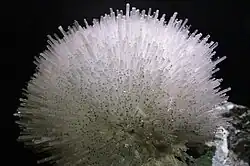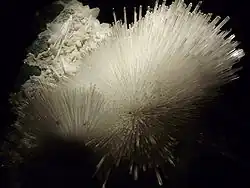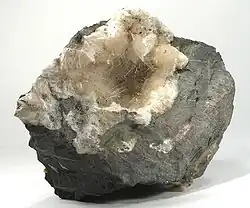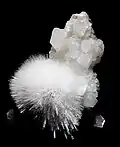Mesolite
| Mesolite | |
|---|---|
 Mesolite from Bombay collected in the 18th century by Dr John Hunter | |
| General | |
| Category | Tectosilicate minerals, zeolite group, natrolite subgroup |
| Formula | Na2Ca2Si9Al6O30·8H2O |
| IMA symbol | Mes[1] |
| Strunz classification | 9.GA.05 |
| Crystal system | Orthorhombic |
| Crystal class | Pyramidal (mm2) (same H-M symbol) |
| Space group | Fdd2 |
| Unit cell | a = 18.4049(8) Å, b = 56.655(6) Å, c = 6.5443(4) Å; Z = 8 |
| Identification | |
| Color | Colorless, white, gray, yellowish brown |
| Crystal habit | As elongated prismatic crystals, commonly in hairlike tufts and aggregates of fibers; radiating compact masses; stalactitic; porcelaneous |
| Twinning | Characteristically twinned on {010} or {100} |
| Cleavage | Perfect on {110} and {110} |
| Fracture | Uneven |
| Tenacity | Brittle, masses tough |
| Mohs scale hardness | 5 |
| Luster | Vitreous, silky when fibrous |
| Streak | White |
| Diaphaneity | Transparent to translucent, opaque |
| Specific gravity | 2.26 |
| Optical properties | Biaxial (+) |
| Refractive index | nα = 1.505 nβ = 1.505 nγ = 1.505 |
| Birefringence | δ = 0.001 |
| 2V angle | Measured: 80° |
| Other characteristics | May exhibit a small pyroelectric effect; piezoelectric |
| References | [2][3][4][5] |
Mesolite is a tectosilicate mineral with formula Na2Ca2Si9Al6O30·8H2O. It is a member of the zeolite group and the natrolite subgroup,[4] also resembling natrolite in appearance.
Mesolite crystallizes in the orthorhombic system and typically forms fibrous, acicular prismatic crystals or masses.[3] Radiating sprays of needlelike crystals are not uncommon. It is vitreous in luster and clear to white in color. It has a Mohs hardness of 5 to 5.5 and a low specific gravity of 2.2 to 2.4. The refractive indices are nα=1.505 nβ=1.505 nγ=1.506.
Occurrence
It was first described in 1816 for an occurrence in the Cyclopean Islands near Catania, Sicily.[5] From the Greek mesos, "middle", as its composition lies between natrolite and scolecite.[4][5] Like other zeolites, mesolite occurs as void fillings in amygdaloidal basalt also in andesites and hydrothermal veins.[3]
Images
-
.jpg) Mesolite
Mesolite -
 "Puff ball" of mesolite in a basaltic vug
"Puff ball" of mesolite in a basaltic vug -
 Mesolite often forms in fibrous crystals
Mesolite often forms in fibrous crystals -
 A pocket of hairlike acicular crystals of mesolite growing off thomsonite
A pocket of hairlike acicular crystals of mesolite growing off thomsonite -
 Fibrous crystal sample retrieved from caverns near Pune, India
Fibrous crystal sample retrieved from caverns near Pune, India
References
- ^ Warr, L.N. (2021). "IMA–CNMNC approved mineral symbols". Mineralogical Magazine. 85 (3): 291–320. Bibcode:2021MinM...85..291W. doi:10.1180/mgm.2021.43. S2CID 235729616.
- ^ Mineralienatlas
- ^ a b c Handbook of Mineralogy
- ^ a b c Mindat.org
- ^ a b c Webmineral data